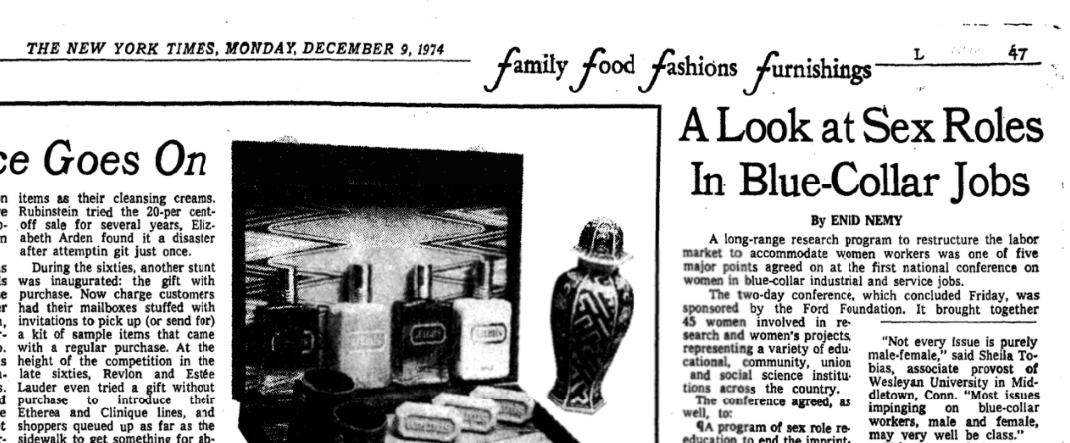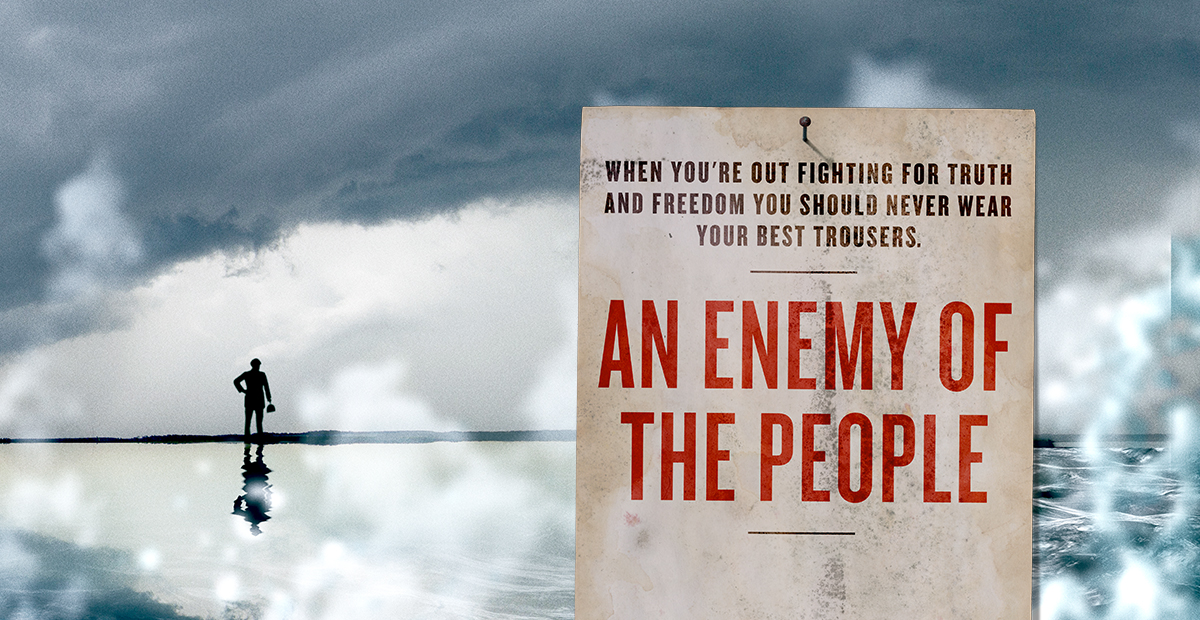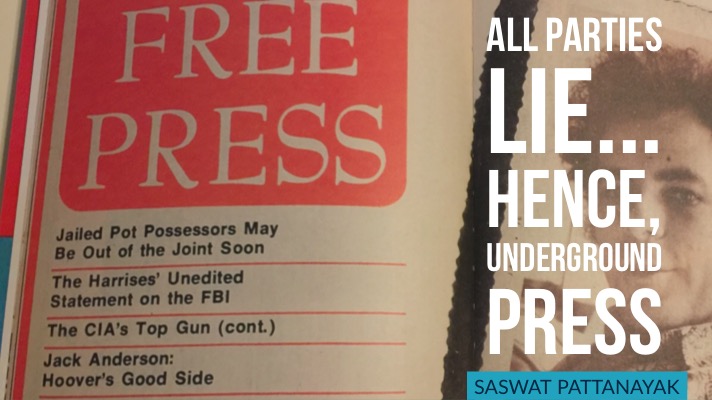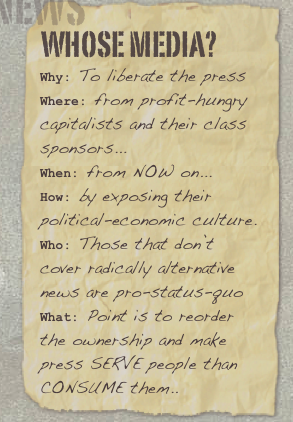By Saswat Pattanayak
New York Times faced a class-action lawsuit in 1974 brought against it by 600 of its own women employees. An affirmative action plan mandating progressive hiring practices was to be the outcome of its settlement, four years later. Who were these courageous women and what were their professional commitments like? Today’s New York Times digs into this history and offers a tribute to those times when women staff writers contributed to a page named after its four themes – Food, Fashions, Family, Furnishings. They wrote about culinary interests and peculiarities in fashion (the only radical writings cited by the report include profiles of Richard Avedon and Diana Vreeland). According to the NYTimes reporter Amanda Svachula, The four F’s page ran from 1955 to 1971, and “around 1971, the header was changed to Family/Style”.
But that is not entirely accurate. Ms. Svachula has written an exceptional piece, no doubt. It is a much-needed peek into the 70’s, and how journalism has evolved since. At the same time, some fact-checks need to be done, and a critical approach to the understanding of the evolution adopted.
Firstly, contrary to the report, the “Food, Fashions, Family, Furnishings” page was not retired in 1971. Indeed, it was very much active even in 1974. It was eventually renamed, but the chronological accuracy is of essence. It is of essence, also because the NYTimes article today completely overlooks the pattern of reporting that was conducted by its women reporters throughout the 70’s. I will use Enid Nemy as a case study to argue that the same “Four Fs” page (and subsequently, Style) was consistently also used by women reporters to address women’s rights and issues surrounding feminist movement of the time.
For instance, on December 9, 1974, Enid Nemy’s wrote a piece titled, “A look at Sex Roles in Blue-Collar Jobs”. It is true that her story appeared as a two-column story, whereas the main lead for that page on the day with a five-column spread was titled “Cosmetics Gift Race Goes On”. But Nemy’s story was clearly the more powerful one – it highlighted a class analysis related to blue-collar workers – both women and men. She quoted Professor Alice Cook from Cornell University describing female work force as possessing unique characteristic of the phase of re-entry into the workforce. “This is a special problem, because women’s work is interrupted and men’s is not.” She also quoted Professor Sheila Tobias in a panel on “white blue-collar workers and feminism”, as saying, “Not every issue is purely male-female. Most issues impinging on blue-collar workers, male and female, may very well be class.” Nemy explored the concerns of the black women as the “group that suffers most from unemployment.”
In 1975, Nemy’s report on November 8, titled “Feminists reappraise direction and image” was an analysis of the entire women’s rights movement in the backdrop of Equal Rights Amendment which had failed to pass. Nemy offered a platform to a diverse range of voices. Whereas one feminist said the movement had “ignored or misunderstood a lot of women”, another said, “a large number of women didn’t trust the present movement and the present leadership.” Yet another said, “We have to reach out to the housewife. The movement pays lip service to them, but their work should be honored and respected.” Nemy depicted the conflicts and the “bickering” and the “fight among ourselves” that had become the mainstay of feminist movement of the time. Like a sincere reporter, a chronicler, and unlike most professional journalists, as an interpreter of the events, Nemy continued her work.
For several years, Enid Nemy reported on issues of women’s rights within the Style page. She extensively covered the “second stage” of the women’s movement in New York Times. She described a panel that would make Selma James proud today. A panel titled “Helping the Homemaker, New Needs, New Problems” in 1979 had argued that the women’s movement had “denigrated the role of homemaking.”
A panel titled “Marriage as an Economic Partnership” challenged the amount of discretion allotted to judges in divorce proceedings, and discussed marital property reforms aiming to empower non-wage earning spouses to obtain credit.
After quoting Alvin Toffler at the panel envisioning a “demassified third wave” in the following century, where considerable amount of work will be shifted to home, and Isaac Asimov at the panel predicting the takeover of mundane jobs by machines, Enid Nemy brilliantly concludes her report in an irrepressibly witty manner with a feminist in the audience who smiled and said, “We just got out of the house, and they’re putting us back in.”
What is instructive in this context is that the Fashion/Style page was being subverted with women’s rights issues by the women journalists of the day. Nemy reported on a Fashion Group Inc. seminar, no doubt, but because it focused on how professional women could benefit from awareness around credit line and credit history. Nemy conveyed the advices of panelists which rings true to this day for many professional women, who should “Establish a financial identity in their own names, not just their husbands; have some bank assets in their own names; have charge account cards in their own names, rather than their husbands’ name or as Mrs. Someone; and, establish a line of credit at a bank before it was needed, since it would cost nothing if it wasn’t used.”
The female reporters were not simply “kept upstairs” by the Times, as the headline today suggests. These journalists attended and covered the women’s movement, interviewed feminists, and shared opinions. After attending a women’s forum at the Russian Tea Room, Enid Nemy shared some radical feminist thoughts with her readers. She quoted Dr. Suzanne Keller of Princeton University as arguing that the stereotypical images of gender are harmful even when there is a depiction of fantasy superwoman. In Dr. Keller’s words, “To assume that a conventional family life can be combined with unconventional achievements means that you have only yourself to blame if this is not so for you. The notion that it is up to the woman to find way exempts social institutions, and men, from their responsibilities, and self‐blame serves the status quo.”
Not all events covered by Enid Nemy were necessarily radical, and by being so, they provide unique insights into the history of feminism. In one conference, she writes, subject of reverse discrimination was introduced by Nobel Laureate (in Medicine) Dr. Rosalyn Yalow who chastised the purposes of a women’s organization which she said was merely to “self-destruct….there is no such thing as equality if there is a need for women’s organizations.” Likewise, Professor Judith Stiehm hypothesized that if women entered armed forces, then the men may have to enter the realm of infant nurturing because “when the role of the warrior is no longer exclusively masculine, much of its luster will be lost.”
In a sense, Nemy’s reporting reflected highest journalistic values of objectivity – in that, she did not limit herself to her own sets of beliefs; but it was more importantly, subversive. She refused to remain within the confines of traditional expectations from someone assigned to the beauty care and style page.
On a page where a story on John Weitz’s designs for women (“From a Men’s Designer, Easy Clothes for Women”) took up most space, Nemy ran a five-column feature on “the Urban Widow”. She interviewed several women for this article and ended with the “widow with the modest fortune” as someone that summed up the piece with these words, “Marriage is lovely, but I’ve enjoyed just about as much as I can stand.”
Civil rights were not gained overnight by a change of heart in the authority, or via threats of lawsuits. Progressive people from all walks of life engage in constant struggles against the status quo in order to improve it for the next generations. Female reporters of the Times were perhaps assigned a specific floor and a specific theme, but as Nemy’s and her peers’ works demonstrate, they did not simply wait for a change to happen. They became part of the movement that forced the establishment to change the page’s header and to accommodate writings about women’s rights and feminism. The headline is not that they were confined, but that they prevailed.





